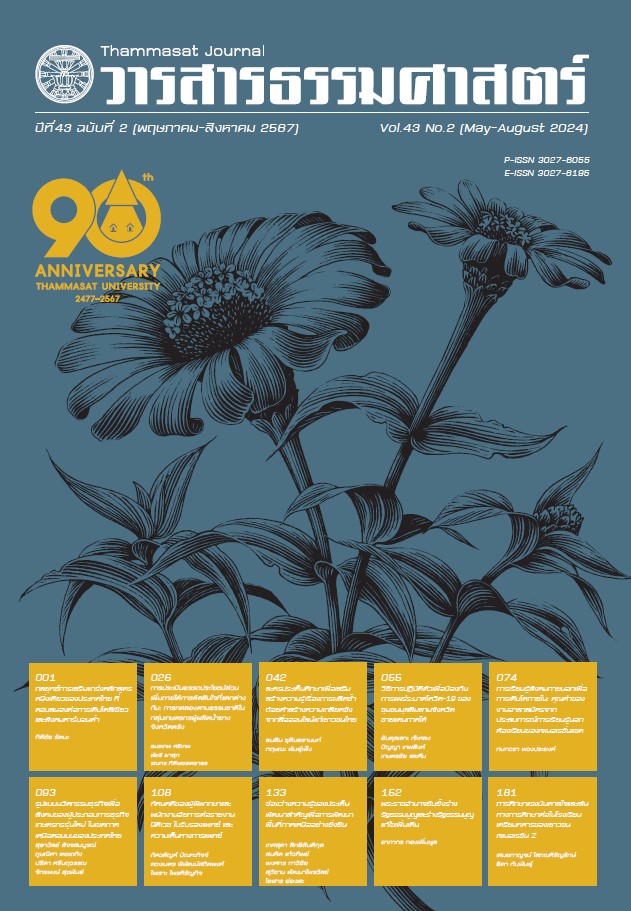Learning in Society to Build Insight: The Value of Volunteerism from Learning Experience Outside the Classroom among Generation Z
Main Article Content
Abstract
Qualitative research based on descriptive phenomenology was conducted to study the value of volunteerism as a learning experience outside the classroom among Generation Z. Data was collected using semi-structured interviews from 30 key informants, all first-year students at the Puey Ungphakorn School of Development Studies, Thammasat University, who were born between 1998 and 1999 and had experience as organizational volunteers for one month. The study found that there are 10 organizations where students participate in volunteer work experiences. These are divided into volunteer work related to promoting and developing skills and life skills for children and youth, supporting the development of people with disabilities and the homeless, and fundraising for organizational development. The results showed that 96.7 percent of the students reflected that this volunteer activity was their first volunteer experience, with the benefits of expanding opportunities for target social groups. Moreover, the value that students received as volunteers included expanding their worldview and deeply understanding societal issues of interest, reducing ego, enhancing positive thinking skills, developing time management and teamwork skills, practicing self-discipline and patience, and feeling proud to be part of integrating classroom knowledge to concretely help society.
Article Details
References
กระทรวงพัฒนาสังคมและความมั่นคงของมนุษย์. (2556, 5 มีนาคม). ปฏิญญาอาสาสมัครไทย. https://www.m-society.go.th/news_view.php?nid=861
เกรียงศักดิ์ เจริญวงศ์ศักดิ์. (2551, 2 กุุมภาพันธ์). งานอาสาสมัครสร้างคนสร้างองค์กร. http://www.kriengsak.com/node/1439
ชาย โพธิสิตา. (2562). ศาสตร์และศิลป์แห่งการวิจัยเชิงคุณภาพ: คู่มือนักศึกษาและนักวิจัยสังคมศาสตร์.(พิมพ์ครั้งที่ 8). กรุงเทพมหานคร: อมรินทร์พริ้นติ้งแอนด์พับลิชชิ่ง.
วิทยาลัยพัฒนศาสตร์ ป๋วย อึ๊งภากรณ์. (2564). มคอ.2 รายละเอียดของหลักสูตรศิลปศาสตรบัณฑิต สาขาวิชานวัตกรรมการพัฒนามนุุษย์และสังคม (หลักสูตรปรับปรุง พ.ศ. 2564). สืบค้น 21 ธัันวาคม 2565, จาก https://www.psds.tu.ac.th/_files/ugd/b8deb4_67222435540c4192876cfb854e6b673a.pdf
ศุภรัตน์ รัตนมุขย์. (2548). อาสาสมัคร: การพัฒนาตนเองและสังคม. วารสารสำนักบัณฑิตอาสาสมัคร, 1(2), 1-9.
สุภางค์ จันทวานิช. (2552). การวิเคราะห์ข้อมูลในการวิจัยเชิงคุณภาพ. (พิมพ์ครั้งที่ 9). กรุุงเทพมหานคร: สำนักพิมพ์แห่งจุฬาลงกรณ์มหาวิทยาลัย
อัญชลี ทองเอม. (2561). การเรียนรู้โดยใช้โครงงานเพื่อการพัฒนาผู้เรียนในศตวรรษที่ 21. วารสารวไลยอลงกรณ์ปริทัศน์ (มนุษย์ศาสตร์และสังคมศาสตร์), 8(3), 185-199.
Bandura, A. (1997). Social Learning Theory. New Jersey: Englewood Cliffs.
Bender, W. N. & Waller, L. (2011). The Teaching Revolution. Corwin: California.
Bezjak, S. & Klemencic, E. (2014). Learning Active Citizenship through Volunteering in Compulsory Basic Education in Slovania. Traditiones, 43(3), 51-65.
Chillakuri, B. & Mahananda, R. (2018). Generation Z Entering the Workforce: The Need for Sustainable Strategies in Maximizing Their Talent. Human Resource Management International Digest, 26(4), 34-38.
Dewey, J. (1997). Experience and Education. New York: Simon & Schuster.
Gallarza, M. G., Arteaga, F. & Gil-Saura, I. (2013). The Value of Volunteering in Special Events: A Longitudinal Study. Annals of Tourism Research, 40, 105-131.
Habitat for Humanity. (n.d.). The Value of Volunteering (Evidence Brief). Retrieved December 22, 2022, from https://www.habitat.org/sites/default/files/documents/Value-of-Volunteering-EvidenceBrief.pdf
Horsley, G. (2018, November 9). Gen Z: What You Need To Know About The Newest Generation of Donors And Volunteers. https://www.forbes.com/sites/forbesnonprofitcouncil/2018/11/09/gen-z-what-you-need-to-know-about-thenewest-generation-of-donors-and-volunteers/?sh=6da519f22fd6
Lanier, K. (2017). 5 Things HR Professionals Need to Know about Generation Z: Thought Leaders Share their Views on the HR Profession and Its Direction for the Future. Strategic HR Review, 16(6), 288-290.
Mahapatra, G. P., Bhullar, N. & Gupta, P. (2022). Gen Z: An Emerging Phenomenon. NHRD Network Journal, 15(2), 246-256.
Meier, S. (2006). A Survey of Economic Theories and Field Evidence on Pro-social Behavior. Boston: Federal Reserve Bank of Boston’s Research Center for Behavioral Economics and Decision Making.
Miller, L. J. & Lu, W. (2018, August 20). Gen Z is Set to Outnumber Millennials within a Year, https://www.bloomberg.com/news/articles/2018-08-20/gen-z-tooutnumber-millennials-within-a-year-demographic-trends
Mihelich, M. (2013). Another Generation Rises. Workforce Management, 92, 34-38.
Middlemiss, N. (2015, March 9). Why Gen Z Will Change the Way You Lead. https://www.hcamag.com/au/news/general/why-gen-z-will-change-the-way-you-lead/142163
Nelson, T. S. (2023). The Value of Volunteer Leadership for University Students Formerly Enrolled in Prescribed Reading: An Anti-Deficit Model. Journal of College Academic Support Programes, 5(2), 34-46.
Ramona. B. (2009). Older Adult Aged as Volunteers. Journal of Gerontological Social Work. 2(2009), 32-39.
Santinello, M., Cristini, F., Vieno A. & Scacchi, L. (2012). “Volunteering by Chance” to Promote Civic Responsibility and Civic Engagement: Does It Work?. Journal of Prevention & Intervention in the Community, 40, 64-79.
Singh, A. P. & Dangmei, J. (2016). Understanding the Generation Z: the Future Workforce. South-Asian Journal of Multidisciplinary Studies, 3(3), 1-5.
UnitedHealthcare. (2017). Doing Good is Good for You Study. Retrieved December 22, 2022, from https://www.unitedhealthgroup.com/content/dam/UHGPDF/2017/2017_Study-Doing-Good-is-Good-for-You.pdf
สัมภาษณ์
นักศึกษาคนที่ 1. (30 พฤษภาคม 2561). สัมภาษณ์. เพศชาย.
นักศึกษาคนที่ 5. (30 พฤษภาคม 2561). สัมภาษณ์. เพศหญิง.
นักศึกษาคนที่ 7. (31 พฤษภาคม 2561). สัมภาษณ์. เพศหญิง.
นักศึกษาคนที่ 10. (31 พฤษภาคม 2561). สัมภาษณ์. เพศชาย.
นักศึกษาคนที่ 13. (3 มิถุนายน 2561). สัมภาษณ์. เพศชาย.
นักศึกษาคนที่ 15. (3 มิถุนายน 2561). สัมภาษณ์. เพศชาย.
นักศึกษาคนที่ 22. (8 มิถุนายน 2561). สัมภาษณ์. เพศชาย.
นักศึกษาคนที่ 24. (8 มิถุนายน 2561). สัมภาษณ์. เพศหญิง.
นักศึกษาคนที่ 27. (10 มิถุนายน 2561). สัมภาษณ์. เพศหญิง.
นักศึกษาคนที่ 30. (10 มิถุนายน 2561). สัมภาษณ์. เพศหญิง.

